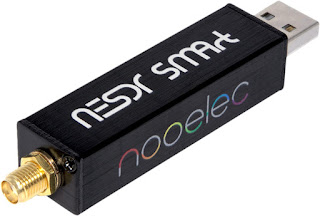Software Defined Radio (SRD) is a radio receiver where minimal hardware is used and most of the signal processing is done by a computer. The benefits are extremely wide frequency coverage with multiple modes of communication at very low cost.
I purchased the NESDR SMArt RTL-SDR v5 from Amazon for US$44. It's a USB dongle that ships with a USB extension cable and three small antennas.
No software is provided but the application Gqrx is provided with Mageia 9. It does require some manual configuration for use with Mageia. Although UBUNTU-focused, the Gqrx HOWTO is a useful starting point.
To install on Mageia 9:
1. Install gqrx and gnuradio:
$ sudo urpmi gqrx gnuradio
2. Create the group plugdev
$ sudo groupadd plugdev
3. Add your user to the group plugdev.
4. Blacklist the default drivers by creating the file /etc/modprobe.d/blacklist-dvb.conf and edit it to include the following: blacklist dvb_usb_rtl28xxu
5. Install the driver we want:
$ sudo urpmi rtl-sdr (It may already be installed.)
6. Create a udev rule for the device:
Create /etc/udev/rules.d/rtl-sdr.rules and edit it to include the following:
# RTL2832U OEM vid/pid, e.g. ezcap EzTV668 (E4000), Newsky TV28T (E4000/R820T) etc.
SUBSYSTEMS=="usb", ATTRS{idVendor}=="0bda", ATTRS{idProduct}=="2838", ENV{ID_SOFTWARE_RADIO}="1", MODE="0660", GROUP="plugdev"
8. Test to see if the dingle is detected and working.
$ rtl_test
$ gqrx

Comments